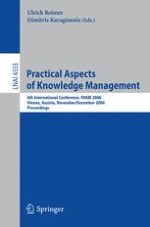The biennial PAKM Conference Series o?ers a communication platform and meeting ground for practitioners and researchers involved in developing and deploying advanced business solutions for the management of knowledge in - ganizations. PAKM is a forum for people to share their views, exchange ideas, develop new insights, and envision completely new kinds of knowledge mana- ment solutions. PAKM 2006, the Sixth International Conference on Practical Aspects of Knowledge Management, was held again in Vienna. It was a milestone for two reasons: First, it marked an anniversary – 10 years of PAKM conferences. The ?rst conference was held in Basel, Switzerland, in 1996, followed by the conf- ences in 1998 and 2000, in Basel as well. After that PAKM moved to Vienna where it was held in 2002, 2004, and 2006. Secondly, from now on PAKM will be “on tour”: It will be organized by di?erent people and be hosted at di?erent places all over the world. The PAKM Steering Committee will be responsible for selecting the conference chairs and the conference locations. The Steering Committee will also be responsible for the direction the PAKM conferences will take and will ensure their continuing high quality. For this year’s conference we received 123 submissions from 30 countries.
